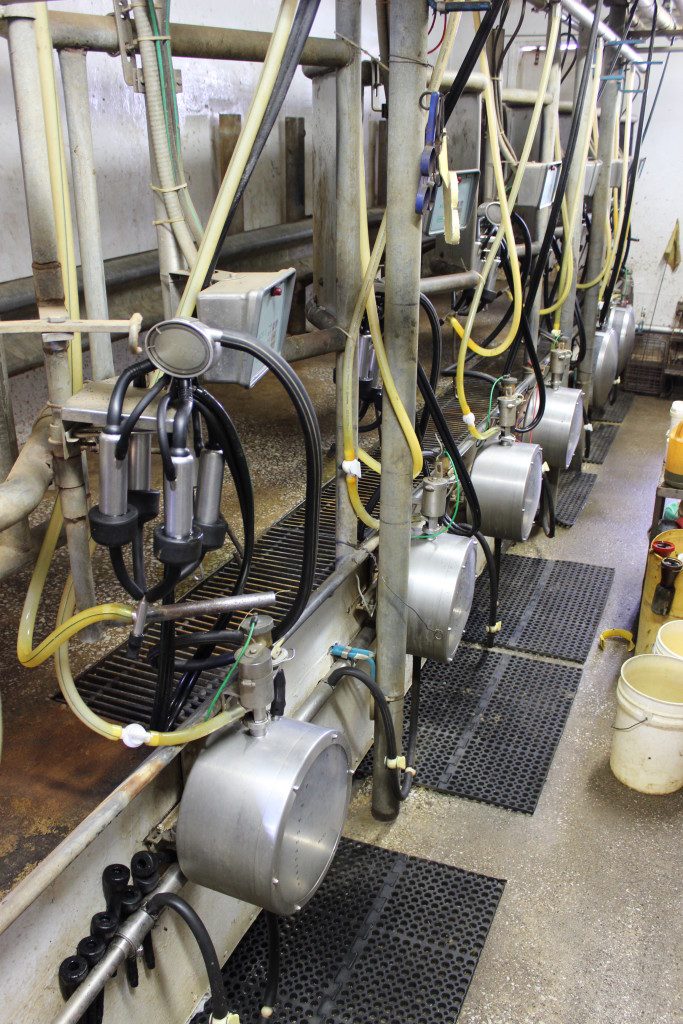Welcome! Are you a subscriber? Click here to receive my weekly newsletter. Thanks for visiting!
Farmers and Technology: How Are Farmers Using Technology to Make Their Farms Better?
In my first visit with the Troxel Family of Troxel Dairy Farm we learned about where our milk comes from and got a glimpse into the life of a dairy family. In this post we delve a little deeper into how technology has changed how farms operate. I invite you to share a comment below on how technology has changed how you live, work and play. I was invited by Indiana Dairy to learn more about the dairy industry. Like everything you see on Basilmomma.com, all opinions are my own.
I can certainly list about 10 ways in which technology has improved how I live, work and play. From programmable slow-cookers to a cell phones, there is something that is said to improve your life everywhere you look. There are still some things I am holding onto like books with pages, newspapers, and printing my photos. For the most part I have embraced all things “new”. It doesn’t mean I understand it all, but I do enjoy my tablet for watching movies or my computer for getting my work done in a more efficient manner.
But how have advances in technology affected other areas of business like medicine, construction or- farming? How are farmers using technology to make their farms better?
Farmers have a vested interest in protecting wetlands, eco-diversity and other natural resources. For centuries, they’ve used traditional methods such as crop rotation and mulching to preserve the fertility of the land. Today, dairy farmers have even more options at their disposal to help reduce their environmental footprint.
Soil Friendly
Thanks to state-of-the-art manure handling equipment, storage facilities and application processes, it’s easy for farmers to get proper nutrients to the soil, while protecting against runoff and reducing air emissions. One way farmers handle manure is through modern mechanical separators, which separate the solids and liquid in manure. The solids can be directly applied to cropland or composted and sold as organic fertilizer. The separated liquids can be recycled and used for flushing alleys in the barn and irrigating fields. Technology also has shown that there are many ways to fertilize a field beyond applying the manure directly to the crop. One alternative uses high-tech equipment to “inject” underline or mix the manure right into the soil, which minimizes odor while adding rich nutrients into the soil.
Another high priority for farmers is storing the solid and liquid manure until weather conditions are right for fertilizing the land. Many farmers use progressive lagoons to store and naturally treat the manure. In a lagoon, solids settle to the bottom, and bacteria and microorganisms break down the manure that results in a nutrient-rich waste water with fewer odors. Cutting-edge research seeks to further enhance the benefits of lagoons on farms. One example is adding algae to lagoons. The oxygen produced by the algae allows odor-eating bacteria to live longer, resulting in an even greater reduction of odor.
Power-Up!
Alternative energy is all the buzz these days, and dairy farmers are caught up in it too. On some farms, methane digesters are used to collect methane gas released from manure and convert it to energy. This “biogas” is a renewable fuel that can be used to generate electricity for both the dairy farm and the local community.
How does this translate to our featured farm family?
I asked LuAnn Troxel of Troxel Dairy Farm what kind of role technology plays on their farm. With her husband being a veterinarian and her son Rudy managing the genetics of the animals, the use of technology and staying up to date is key. To succeed you need to keep one foot planted (pun intended) in the old ways that worked and keep your finger at the pulse of how practices are evolving and make improvements. Sustainability means doing more with less, and that means adapting to a changing market too. If (all)farmers didn’t practice sustainability…there would sure be less farms.
It goes without saying that technology can’t replace good old common sense and experience. Some things you just know. The feel, the sound, the way an animal is standing, how they eat- these are nuggets of wisdom gleaned from years of experience and hands on farming.
Read more about the Troxel Family HERE.
